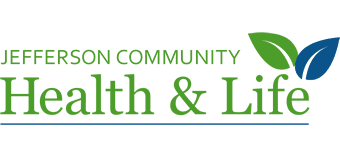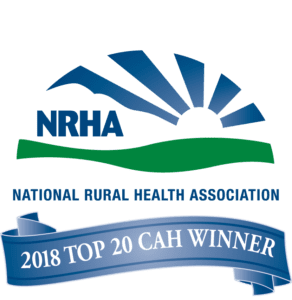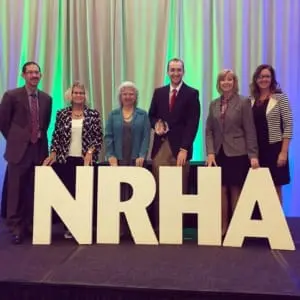Jefferson Community Health & Life Gardenside in Fairbury hosted the Great Plains Quality Innovation Network and team members of the National Coordinating Center on Oct. 17, 2018. The National Coordinating Center is the CMS-designated Quality Innovation Network-National Coordinating Center which supports the nation’s quality improvement organizations, like Great Plains QIN, in their efforts to achieve CMS goals for better health, better care and lower costs.
The purpose of the visit was to identify innovative practices that contribute to success and or improvement. Similar site visits are occurring in healthcare organizations across the country. The intent is to spread innovative healthcare practices with other facilities and quality improvement organizations.
As a way to improve resident-centered care, the quality assurance team at Gardenside implemented ‘natural awakening’ as a way to improve the overall sleep hygiene and the health and safety of their residents while promoting a more ‘home-like’ environment.
“Natural Awakening enhances sleep hygiene and proves how a good night of undisturbed sleep is one of the most important services we can give residents. By eliminating or minimizing night-time interruptions the resident receives more restorative sleep that is needed to maintain and enhance their quality of life,” said Deb Sutton, RN, Gardenside Administrator.
The Gardenside team outlined several elements of their success. First, it is imperative to partner with the pharmacy team to decrease and alter medication times to reduce the frequency of medication passes and avoid having to wake residents to dispense medications. Second, visiting with residents and their family members prior to implementing the natural awakening program is necessary. This conversation allows the resident to share his/her preferred sleep environment and whether they have a preference for their wake-up time. The Gardenside team also adjusted the dining room schedule to adjust for residents having an expanded timeframe to eat breakfast.
“As a result of this effort to facilitate natural awakening, Gardenside has experienced a decrease in falls, antipsychotic medication use and infection rates. This information has been shared with other nursing homes through a number of educational sessions and the Gardenside team has willingly mentored homes who wish to implement natural awakening. The commitment to improving resident care is impressive. Gardenside sets the bar high in their continued quest for quality improvement. We are pleased to be able to help share their story with the NCC team and others,” said Krystal Hays, DNP, RN, RAC-CT; Quality Improvement Advisor with the Great Plains QIN.
“Improving the quality of care in our facility is and will continue to be a priority,” said Deb Sutton, Administrator. “Studies have shown that lack of sleep leads to a dramatic decline in a person’s ability to perform even simple tasks. Individuals who are sleep-deprived may experience drowsiness, irritability, lack of concentration and impaired performance. Furthermore, sleep deprivation compromises the immune system and persistent sleep deprivation can result in significant mood swings and erratic behavior. We believe in the power of natural awakening for improved health and quality of life. We enjoyed the opportunity to share our story; and will continue to do all we can to provide exceptional care at Gardenside and share what we have learned.”
“The Natural Awakening Program needs to be shared and spread throughout all nursing facilities; the NCC views this program as a best practice. The NCC has requested that Gardenside provide their knowledge on a future National Learning and Action Event,” said Jane Brock, MD, MSHP; Medical Director for the NCC.
Great Plains QIN is the Quality Improvement Organization for Kansas, Nebraska, North Dakota and South Dakota. The GPQIN team works with healthcare providers and communities to implement data-driven quality initiatives to improve healthcare. Great Plains QIN offers technical assistance, tailored education, best practices, tools and resources. Through these efforts, we intend to improve patient safety, reduce harm and improve clinical care at the local and regional levels.

 The Top 20 Critical Access Hospitals scored best among critical access hospitals as determined by the Chartis Center for Rural Health. The rankings were announced in the spring by the National Rural Health Association (NRHA.)
The Top 20 Critical Access Hospitals scored best among critical access hospitals as determined by the Chartis Center for Rural Health. The rankings were announced in the spring by the National Rural Health Association (NRHA.)
